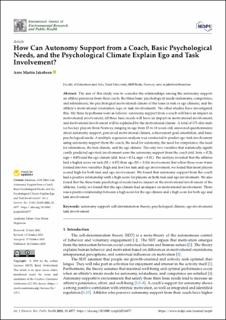| dc.description.abstract | The aim of this study was to consider the relationships among the autonomy support an athlete perceives from their coach, the three basic psychological needs (autonomy, competence, and relatedness), the psychological motivational climate of the team (a task or ego climate), and the athlete’s motivational orientation (ego or task involvement). No other studies have investigated this. My three hypotheses were as follows: autonomy support from a coach will have an impact on motivational involvement, all three basic needs will have an impact on motivational involvement, and motivational involvement will be explained by the motivational climate. A total of 175 elite male ice hockey players from Norway, ranging in age from 15 to 18 years old, answered questionnaires about autonomy support, perceived motivational climate, achievement goal orientation, and basic psychological needs. A multiple regression analysis was conducted to predict ego–task involvement using autonomy support from the coach, the need for autonomy, the need for competence, the need for relatedness, the task climate, and the ego climate. The only two variables that statistically significantly predicted ego–task involvement were the autonomy support from the coach (std. beta = 0.28, sign = 0.05) and the ego climate (std. beta = 0.34, sign = 0.01). The analysis revealed that the athletes had a higher score on task (M = 4.85) than ego (M = 3.34) involvement, but when these were transformed into two variables (high and low) for task and ego involvement, we found that most players scored high for both task and ego involvement. We found that autonomy support from the coach had a positive relationship with a high score for players on both task and ego involvement. We also found that the three basic psychological needs had no impact on the motivational involvement of the athletes. Lastly, we found that the ego climate had an impact on motivational involvement. There was a positive relationship between a high score for the ego climate and a high score for both ego and task involvement. | en_US |

